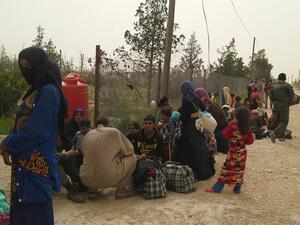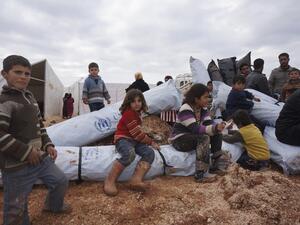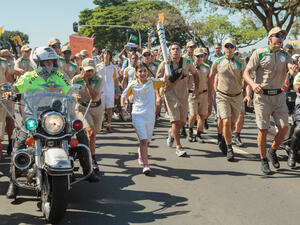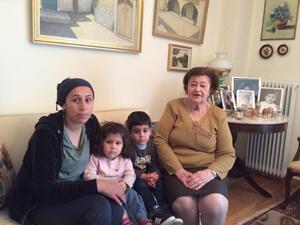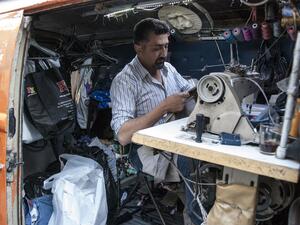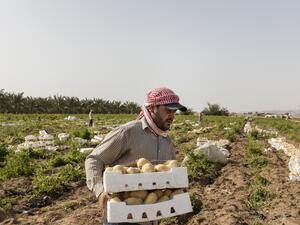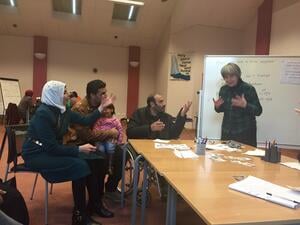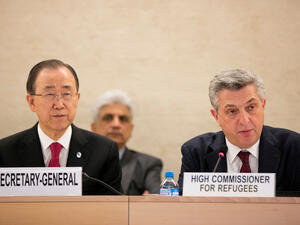UNHCR warns of humanitarian cost of Syrian conflict, especially on the displaced
UNHCR warns of humanitarian cost of Syrian conflict, especially on the displaced

UNHCR Assistant High Commissioner Erika Feller gave a speech to the UN Human Rights Council on the dire humanitarian situation in Syria.
GENEVA, February 27 (UNHCR) - The UN refugee agency's top protection official has warned of the enormous humanitarian impact of the Syria crisis, particularly on civilians who have been displaced and face threats such as gender-based violence.
"This displacement is not only about loss of homes and economic security. It is also, for many, accompanied by gender-based crimes, deliberate victimization of women and children and a frightening array of assaults on human dignity," Assistant High Commissioner (Protection) Erika Feller told the UN Human Rights Council in Geneva on Tuesday.
"Reports are revealing that the conflict in Syria is increasingly marked by rape and sexual violence employed as a weapon of war to intimidate parties to the conflict destroying identity, dignity and the social fabrics of families and communities," she added at a meeting of the 47-member inter-governmental body.
Feller said these crimes were often perpetrated in public places such as checkpoints, adding to the humiliation and the stress that displaced people were enduring.
According to UNHCR, more than 920,000 people have fled to neighbouring countries and 2 million have been internally displaced since the conflict began almost two years ago. In addition, more than 4 million people are in need of humanitarian assistance.
The Assistant High Commissioner said child victims were "becoming a defining feature of the Syrian conflict." Noting that children are subjected to a high risk of violence, she said "reports of torture and death of detained children, or of the sexual abuse of both boys and girls, are particularly harrowing." Feller told the Council that the abuse to which children are exposed "is now following them in flight, for example in the form of compelled early marriage in refugee camps."
Feller also stressed that support for victims is often inadequate and access to justice is very limited, increasing impunity for perpetrators.
She called on the Council to actively examine these violations and advocate for the protection of women and children among all parties. The Council should also ensure that peace discussions find space for women to be involved and give proper attention to victims and survivors.
Feller also warned that the refugee population was growing at an unprecedented amount, putting enormous pressure on neighbouring countries to cope with the influx of people.
"The host states, including Jordan, Lebanon, Turkey, Iraq, Egypt and the North African countries, have been exemplary in their different ways, but we fear the pressure will start to overwhelm their capacities," she said. "The resources available are just not enough, and the rate they are coming in is too slow. The tools of burden-sharing, including further afield, need urgent reflection."
Feller also drew attention to the situation of millions of stateless people around the world, "the ultimate forgotten people, without a national identity or legal personality."
She said that despite a UNHCR campaign at the legal and policy levels, statelessness deserved more prominence on the international agenda. But she said there had been some encouraging signs and she praised the Human Rights Council for its role in highlighting the issue.
"UNHCR considers that the Council could play an instrumental role by focusing on resolving the numerous protracted situations of statelessness around the world," she added. "Unresolved situations are swelling the numbers of refugees as the affected persons, such as Myanmar Muslims from Rakhine state, are seeking protection outside their countries of residence through whatever means, including the unseaworthy vessels on which so many are losing their lives."
Based on media and other accounts, almost 500 people, mainly ethnic Rohingya from Myanmar, perished at sea during 2012 after their boats broke down or capsized - making the Indian Ocean one of the deadliest regions in the world for people fleeing their country by boat or being trafficked by smugglers.
The UN Human Rights Council was set up in 2006 to strengthen the promotion and protection of human rights around the globe and to address situations of human rights violations and make recommendations on them. It has the ability to discuss all thematic human rights issues and situations that require its attention throughout the year.
Parts of this article were provided by the UN News Centre


